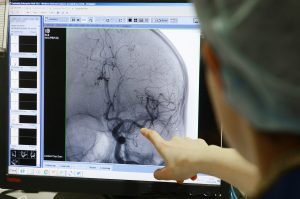Neurophysiology is concerned with the investigation of function in the central and peripheral nervous system.

Working as a healthcare scientist in neurophysiology, you will assist with the diagnosis of neurological disorders, including epilepsy which affects about 10% of the UK population.
Neurophysiology also plays a role in monitoring people who have disorders affecting the brain including viral encephalitis, meningitis, strokes or are suffering with dementia. If you work in this area of healthcare science, you will frequently carry out investigations in dedicated environments or departments, such as in intensive care settings and in operating theatres.
Investigations include:
- EEG (electroencephalography) – a recording of the electrical activity of the brain from the scalp which is mainly used in the diagnosis of epilepsy and monitoring of people with this condition.
- Evoked potentials – these are potentials produced by the brain in response to specific stimuli, for example a flashing light or sounds. Evoked Potential is used in the diagnosis of various conditions including Multiple Sclerosis and eye conditions like night blindness.
- EMG (electromyography) and NCS (nerve conduction studies) – these assess function of the nerves and muscles within the body. Carpal Tunnel Syndrome is commonly diagnosed using NCS. EMG is used in conditions affecting nerve and muscle function including myasthenia gravis, motor neurone disease among others.
Healthcare science staff often work at the forefront of research and innovation, so that patients are continually receiving the very best healthcare. For example, in neurophysiology, you might be investigating ways to overcome spinal cord paralysis.
 In this section
In this section